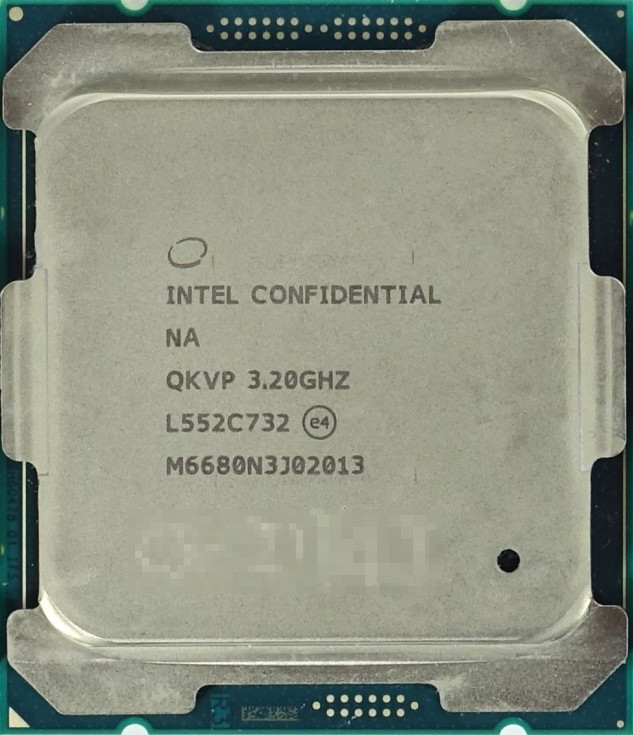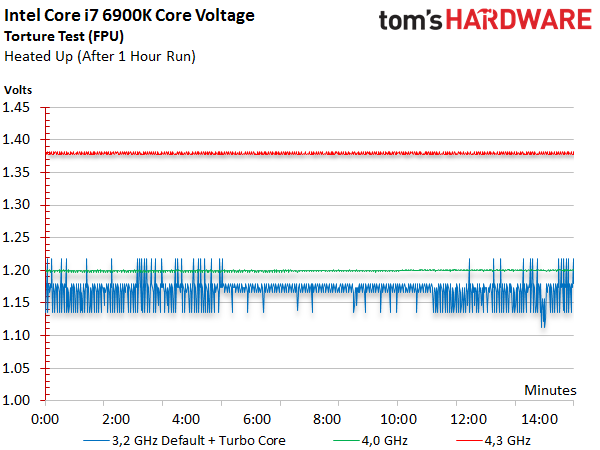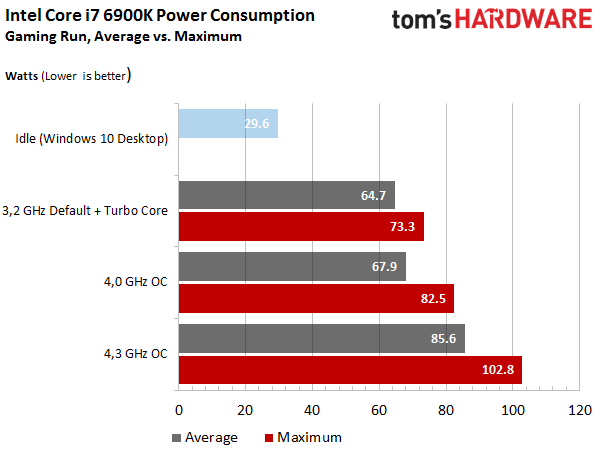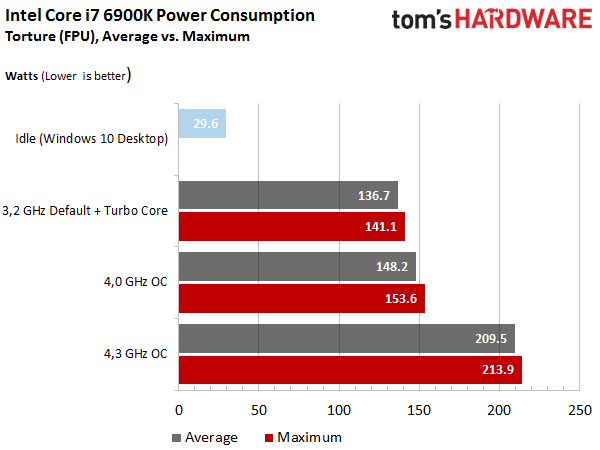Broadwell-E: Intel Core i7-6950X, 6900K, 6850K & 6800K Review
Is Broadwell more attractive to enthusiasts without graphics and up to 10 Hyper-Threaded cores? We test against two previous generations, plus Skylake to find out.
Intel Core i7-6900K: Overclocking, Power & Temperatures
Base Clock Frequency, Turbo Boost & Overclocking
Intel’s Core i7-6900K is the -5690X's direct replacement. The company's least-expensive Broadwell-E models have six cores each, while the -6900K and -5690X sport eight. The Core i7-6900K’s stock base clock rate is 3.2GHz; Intel has to turn this down to fit in the platform's 140W TDP with eight cores active.
No matter how much voltage we pushed through this CPU, our highest stable overclock was 4.3GHz. Beyond that, the system wouldn’t even boot up.
Again, let’s take a look at the individual core frequencies for the three configurations we tested. Despite a 3.2GHz base clock rate, Turbo Boost pushes the CPU to 3.7GHz in lightly threaded workloads. Our sample managed to maintain this frequency across all cores during the stress test. One core even reportedly hit 4GHz.
Core Voltage Necessary For A Stable Overclock
The 1.38V needed to hit 4.3GHz isn't particularly impressive. This improves at 4GHz. Then again, that's barely much higher than Intel's maximum Turbo Boost bin.
Overclocking beyond 4.0GHz results in a massive power consumption increase, and even 1.5V can’t get the CPU over 4.3GHz.
Resulting Power Consumption
Unless a game scales perfectly according to available resources, the power consumption is similar to what we saw from the six-core models. Intel's Core i7-6900K doesn’t really draw any more power than the lower-end implementations of Broadwell-E; it stays under 100W all the way to 4.0GHz.
It's only when all eight cores are fully utilized that the Core i7-6900K really gets going. For the first time in our review, we record a result greater than 200W. This has us curious where the flagship -6950X is going to end up.
Get Tom's Hardware's best news and in-depth reviews, straight to your inbox.
Temperatures During Continuous Operation
Again, we averaged all of the cores together as reported by the sensors for each measurement interval and split them into our various workloads. The results reveal a general problem with Broadwell-E: the 14nm process makes for denser CPUs, which are harder to remove heat from quickly. Our high-end water cooling setup has more trouble cooling the Core i7-6900K than it did with the -5690X, which consumed about the same amount of power at 4.5GHz.
Also, the Core i7-5690X ran stably up to 4.8GHz, and it was possible to get it going at 5.0GHz with a core voltage of 1.5V. Intel's Core i7-6900K can't even come close to matching those numbers.
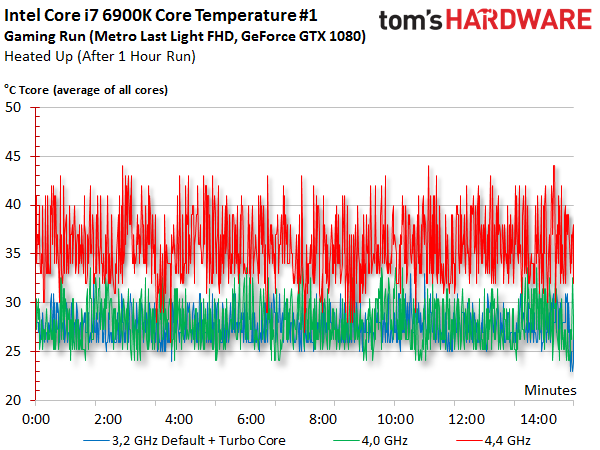
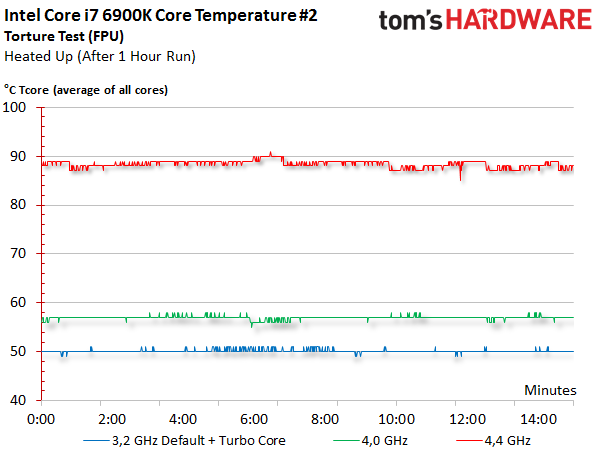
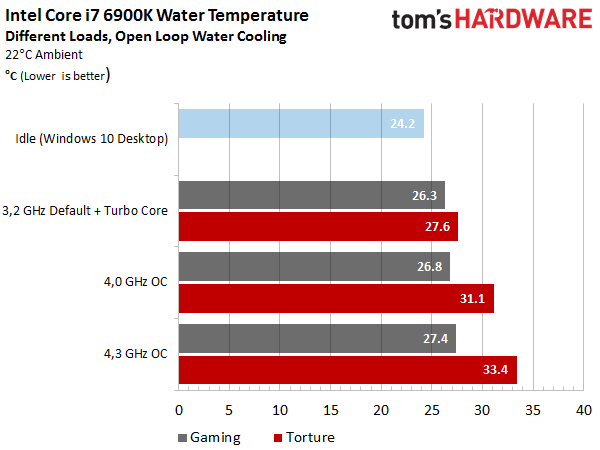
Bottom Line
At the risk of sounding like a broken record, the Core i7-6900K is reasonably efficient at its stock frequency. Overclock it, though, and this changes quickly and drastically. Every 100MHz step up comes at the cost of a hefty core voltage increase. And it can’t be overclocked beyond 4.3GHz at all, no matter how much voltage you add.
Thus, the Core i7-6900K only makes sense if you're using software that scales perfectly with core count. It could be considered suitable for pure gaming workloads, as long as those games don’t just use a single thread.
But if you're an overclocker, the Core i7-5930K is a better alternative to the -6850K, and Intel's Core i7-5960X trumps the -6900K. At the same clock rates, Intel's Haswell-E generation is easier to cool.
MORE: Best CPUs
MORE: All CPU Content
MORE: Intel & AMD Processor Hierarchy
Current page: Intel Core i7-6900K: Overclocking, Power & Temperatures
Prev Page Intel Core i7-6850K: Overclocking, Power & Temperatures Next Page Intel Core i7-6950X: Overclocking, Power & Temperatures-
jt AJ was expecting a bit more info and review usage of turbo 3.0. also looks like most of broadwell E chip is junk.. except that one 6850k chip you received probably lucky 1.25v for 4.4v would be good thats only because its broadwell. got one here for 4.8ghz at just 1.22v.Reply -
Nuckles_56 Chris, how likely is it that a noctua NH-D15 would be able to cool these heat producing monsters if your h100i struggled and failed with the i7-6800k @4.4GHz.Reply
But a truly excellent review, even if it does show that there is little reason to go to broadwell-E over Haswell-E -
elho_cid I'd love to step up to the realm of higher core count, but given the results of Adobe SW when scaling to many threads, meas it is not really useful right now. :/Reply
That's a pity, because the most time I spend staring at a progress bar is when I'm using Adobe products. I don't really need more power to "background tasks" like zipping or lame encoding.
-
AdmiralDonut Standard SLI is not limited on the new NVIDIA cards. The only thing that's limited is the new High Bandwidth SLI. Normal 3 and 4-way SLI can be enabled easily by simply asking NVIDIA for an unlock code, something any half way serious enthusiast will most certainly do. Here's some more info on this matter:Reply
https://www.youtube.com/watch?v=2wBDt9tN5-c -
bit_user I don't really see the point of having a $1700 non-Xeon SKU. Of the few people who can afford it, even less would bother/dare to overclock it.Reply
I'm still wishing for the rumored 5 GHz SKU to surface. I've rarely needed more than 4 cores, but a couple extra GHz always comes in handy. Even so, I'll not be upgrading until at least Skylake-E or perhaps Kaby-E.
-
Cerunnir ReplyChris, how likely is it that a noctua NH-D15 would be able to cool these heat producing monsters if your h100i struggled and failed with the i7-6800k @4.4GHz.
But a truly excellent review, even if it does show that there is little reason to go to broadwell-E over Haswell-E
NH-D15 is arguably better or atleast equal to the H100i when it comes to cooling, and its noise levels is definatly lower both in load and while idle.
http://www.relaxedtech.com/reviews/noctua/nh-d15-versus-closed-loop-liquid-coolers/2 -
bit_user Reply
No. Buy a Xeon version, for that. It's practically the only difference. It's artificial product differentiation, known as "market segmentation".18045773 said:Does it have support for ECC ram?
Here, you can find links to the specs of the CPUs mentioned in this article: http://ark.intel.com/products/family/79318/Intel-High-End-Desktop-Processors#@Desktop If you view their individual specs, you can see that none support ECC.
Intel hasn't yet announced the E5-16xx v4 series CPUs, but you can turn up leaked specs with a bit of searching.
And you'll need motherboard support, too.
-
cats_Paw Good review (excellent if its only the heads up for a more in-depth one).Reply
I have to say that I would love to have a 6 or even 8 core CPU but these prices and performances dont add up.
In my country a 6700K and a 5820K are priced almost the same, but its still a hard choice (Do i want a "maybe" future proof 6 core that can be good for some work or a 4 core that is flat out faster and cheaper to build around for gaming?). -
pyoverdin Am I correct in saying I could build a PC that's 5 FPS off the 6950X for it's price?Reply
